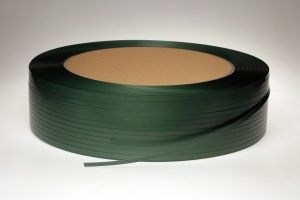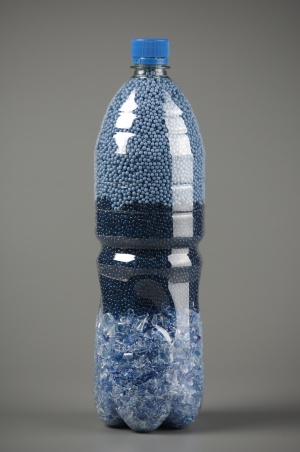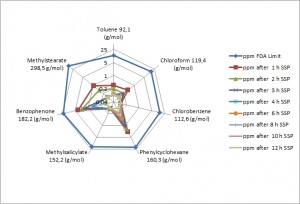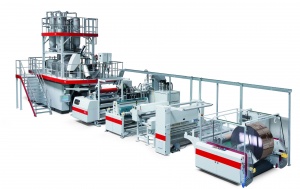RecoStar technology: Difference between revisions
No edit summary |
No edit summary |
||
| Line 3: | Line 3: | ||
The '''recoSTAR PET''' series is designed for the recycling of post-consumer bottle flakes after the washing process as well as for the in-house recycling of PET flakes from bottles, preforms, strapping bands and sheets. The end product is always melt-filtrated, uniform granulate that can be used for a wide range of applications. '''([http://www.starlinger.com/fileadmin/user_upload/03_recycling_technology/Anwendungen/PET/FB_en/index.html Brochure PET Flakes Recycling])''' | The '''recoSTAR PET''' series is designed for the recycling of post-consumer bottle flakes after the washing process as well as for the in-house recycling of PET flakes from bottles, preforms, strapping bands and sheets. The end product is always melt-filtrated, uniform granulate that can be used for a wide range of applications. '''([http://www.starlinger.com/fileadmin/user_upload/03_recycling_technology/Anwendungen/PET/FB_en/index.html Brochure PET Flakes Recycling])''' | ||
== Non-Food applications == | == Non-Food applications == | ||
| Line 30: | Line 31: | ||
PET has an important economic advantage: it can be “upcycled”. What comes out of the recycling process can be a better quality PET than what went in. In order for rPET to meet the high intrinsic viscosity (IV) required for strapping bands, it undergoes a solid state polycondensation (SSP) process. | PET has an important economic advantage: it can be “upcycled”. What comes out of the recycling process can be a better quality PET than what went in. In order for rPET to meet the high intrinsic viscosity (IV) required for strapping bands, it undergoes a solid state polycondensation (SSP) process. | ||
== Food Contact applications == | == Food Contact applications == | ||
Revision as of 12:18, 23 February 2016
recoSTAR PET recycling lines
The decisive criterion for all Polyester applications is that the use of repelletised material should not affect either extrusion or any following process, nor should it jeopardize the quality of the end product. The Starlinger recoSTAR product line offers the ideal solution for PET and PES recycling, as it fulfils both conditions with optimal pre-drying of the PET, ideal screw design, inline quality control, and optional solid stating.
The recoSTAR PET series is designed for the recycling of post-consumer bottle flakes after the washing process as well as for the in-house recycling of PET flakes from bottles, preforms, strapping bands and sheets. The end product is always melt-filtrated, uniform granulate that can be used for a wide range of applications. (Brochure PET Flakes Recycling)
Non-Food applications



Due to availability and properties, PET bottle flakes have manifold applications. The largest amount is used for the production of fibres, filaments and nonwovens. Adding PET flakes when recycling production waste is a possibility to increase the viscosity of the rPET pellets. Finest melt filtration is available; use of up to 100 % rPET pellets possible. PET flakes (of sheet, bottles, preforms) can be pelletised or processed directly inline on a sheet line that produces PET sheet with up to 100 % recycled content. In case of inline application a predrying unit (with or without vacuum) can be installed before the sheet extruder (viscoSHEET) instead of a conventional dryer. In this step, post-consumer material is decontaminated for direct food-contact applications and IV maintained or increased. The combination of recycling step and production step results in a competitive investment costs and helps to reduce energy consumption and maintenance while remaining user-friendly. PET flakes are also a valuable secondary resource for strapping bands, which can be made from up to 100% recycling PET (rPET). In order to meet the high intrinsic viscosity (IV) required, the material undergoes a solid state polycondensation (SSP) process with the Starlinger iV+ technology. In all cases, recoSTAR PET (iV+) offers a competitive solution for superior rPET quality and high reuse rate.
PET film and PES fibre recycling
The recoSTAR dynamic recycling line is designed for the in-house recycling of production scrap inline and offline and the perfect choice for hygroscopic and wet materials, e. g. washed post-consumer waste.
PET film and PES fibres can be recycled directly at the production line in an inline process and fed back in repelletised form to the production line. (Brochure recoSTAR dynamic)
The recoSTAR universal recycling line allows processing of PET film, PES fibres and nonwovens without pre-cutting; only proportioning to fit conveyor belt dimensions is required.The material preparation in combination with the sophisticated software and the dosing screw allows processing of materials with different bulk densities and even of flakes without changing process parameters. (Brochure recoSTAR universal)
For both lines high process reliability is ensured through sophisticated line control, for example one button start/stop as well as standby mode for in-line application. Constant high pellet quality and advantageous investment costs are ensured.
PET strapping
PET flakes are also a valuable secondary resource for strapping bands, which can be made from up to 100 % recycled PET (rPET) when processed with the Starlinger iV+ technology.
PET has an important economic advantage: it can be “upcycled”. What comes out of the recycling process can be a better quality PET than what went in. In order for rPET to meet the high intrinsic viscosity (IV) required for strapping bands, it undergoes a solid state polycondensation (SSP) process.
Food Contact applications

Cleansing efficiency of post-consumer PET is, beside others, the most important aspect to secure food safety for rPET in packaging for direct food contact. Food safety is guaranteed mainly by operating the appropriate equipment with proven cleansing efficiency, continuous process data, rPET quality control, and protocol archiving for traceability. Frequent gas chromatograph tests with rPET deliver even better VOC results than virgin resin.
Recyclers are obliged to strictly comply with the prescribed process parameters and to monitor them – a task which is ensured by the automatic process monitoring system offered by Starlinger.
Various proofs for food contact safety such as the FDA Letter of Non-Objection, Austrian and French approbations, conformity to EFSA, ILSI and German BfR requirements have been achieved. In addition, brand owner approvals underline the superior quality of rPET produced on Starlinger recycling lines recoSTAR PET iV+.
Safety first for the whole value chain
The various stakeholders in a recycling project have different expectations:
- The authorities have to make sure that laws for food-safety are observed.
- The recyclers need efficient and flexible recycling equipment to ensure competitiveness in a volatile industry. Process stability and automatisation guarantee the production of food-contact safe pellets.
- The preform producers demand resin-like quality in terms of viscosity (IV), flow characteristics and processability.
- Bottlers and brand-owners require high rPET content without jeopardizing the visual appearance.
- And finally, all stakeholders including the consumers need to be absolutely certain that the packaging is safe.
recoSTAR PET extrusion (flakes to pellets)

PET flakes are heated and dried in a two-stage process by means of hot air and dry air, or under vacuum (Brochure recoSTAR PET). The special design of the dryer outlet results in center flow prevention, consistent residence time and FIFO processing. This ensures decontamination for food contact applications and ideal preparation for the extrusion process with maintained IV level (recoSTAR PET FG) or with IV increase (recoSTAR PET FG+).
A choice of filtration and pelletising systems are available. Once installed, the unit can be equipped with an SSP reactor (iV+) (Brochure recoSTAR SSP) to increase viscosity and decontamination levels.
recoSTAR PET with Starlinger iV+ technology (flakes to SSP pellets)
The Starlinger iV+ recycling process for PET food contact applications consists of two main steps: the continuous extrusion process, and the semi-continuous solid-stating process either before or after the extrusion step (recoSTAR PET iV+). It turns post-consumer PET flakes into pellets that meet the highest requirements.
Special FIFO design ensures consistent reaction parameters, adjustable IV increase, as well as highly effective decontamination for food contact applications.
With recoSTAR PET iV+ Superior the combined decontamination steps of both the flakes in the vacuum dryer upstream of the extruder (FG+) and the pellets in the SSP reactor downstream of the extruder (iV+) result in the highest possible quality of pellets. This superior decontamination process reduces acetaldehyde (AA) and volatile contamination (VOC) to a minimum.
recoSTAR PET iV+ and SSP features the following advantages:
- Careful treatment of flakes, avoiding dust, high IV loss and degradation
- FIFO (first-in/first-out) principle for flakes and pellets ensures defined residence times
- Increased energy efficiency by using gas, steam, or the residual heat of previous process steps
- Adjustable and consistent IV increase and effective decontamination in the SSP reactor for the reuse of up to 100% rPET
- Modular design of the equipment ensures flexibility and adaptability to different input materials and the changing requirements of rPET users
- Flake treatment, extrusion and solid-stating can be used both stand-alone or inline
- A stand–alone SSP unit can be used for increasing the IV of washed post-consumer flakes and decontamination for direct food-contact packaging (e.g. flake to sheet).
- SSP units have a small footprint, convenient height and can be quickly installed on standard industrial floors.
- The optional SSP treatment allows increase of viscosity and consequently higher rPET content in the final product; also suitable for recoSTAR basic and recoSTAR universal recycling lines.
PET sheet recycling and sheet inline production (viscoSHEET)

PET sheet flakes can either be recycled to pellets (recoSTAR PET FG, recoSTAR PET iV+) or processed directly inline on a sheet line (viscoSHEET) that produces PET sheet with up to 100 % recycled content.
In case of inline application a vacuum SSP reactor (deCON, viscoSTAR) can be installed before the production extruder instead of a conventional dryer. In this step, post-consumer sheet flakes – or also a mixture of flakes from preforms and post-consumer bottles – are dried, decontaminated and their IV increased before being processed on the production line. The higher IV of the final sheet leads to better and faster processing of the material in thermoforming machines with fewer brittle cups or trays.
The combination of recycling step and production step results in competitive investment costs and helps to reduce energy consumption and maintenance while remaining user-friendly. [1](Brochure viscoSHEET)
References
Weblinks
Related articles
PETplanet insider 2015 issue 07/2015: Starlinger supplies South Africa's first B2b recycling plant
- ↑ 1